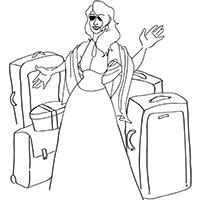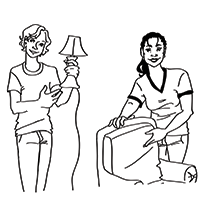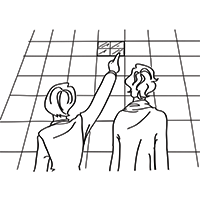Немно́го о языке́ 1.9 Чья э́то ку́ртка?
Asking about ownership
The question word чей (whose?) and the words мой (my/mine), твой (your/yours –singular, familiar), наш (our/ours), and ваш (your/yours – plural or formal) are modifiers that agree with the noun that they modify in gender (masculine, feminine, neuter) and number (singular, plural).
The tables below will show you the specific forms of these words.
Possible answers tо these questions are below.
Listen to and read these phrases:
Notice that masculine singular мой is a one syllable word where you will hear the -о clearly. The plural мои́, however, is a two-syllable word where the stress is not on the -о ... and so it will sound like -а. Be careful not to confuse the stress mark in мои́ with the hook of the й in мой.
Now listen to these phrases, which use the words “our(s)” / “your(s)”:
Again, because of vowel reduction the forms ваше and ваша above will sound identical; the same is true for наша and наше. You will need to know whether to spell -а or –е at the end, but you do not need to worry about hearing or pronouncing them differently.
Here are some hints to help remember the forms:
1) Think of the endings generally associated with each gender and plurals.
2) The endings on forms for мой and твой are identical for all genders (as well as for plurals), so if you know all the endings for one of them, you know the endings for the other. All of the endings for наш and ваш are also identical.
3) The third person forms его́ (his/its), её (her/hers) and их (their) modify nouns of any gender and number. They never change, no matter what noun they modify. Remember that его́ is pronounced е-[в]-о́
Упражне́ние 1. Listening
Various people are in a room sorting through a jumble of items. Listen to the start of each sentence and determine which noun ends the sentence. You will need to pay attention to the gender and number of the possessive pronoun you hear to match the appropriate noun.





